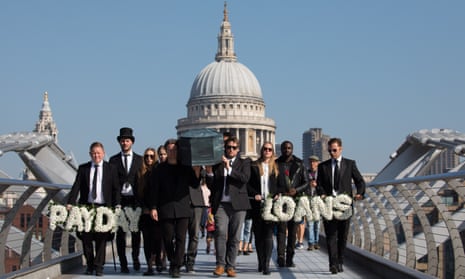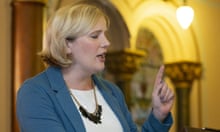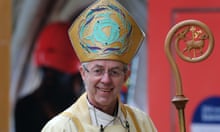The archbishop of Canterbury is to lead a not-for-profit attempt to buy the £400m Wonga loan book after the company collapsed under a welter of compensation claims, the Guardian can reveal.
The Most Rev Justin Welby will next week convene investors and charitable foundations at Lambeth Palace to explore the possibility of a bid for the loans in an effort to protect about 200,000 borrowers who could otherwise be forced to pay back their debts at high rates by a commercial lending firm.
A proposal that the Church of England should buy the loan book using its £7bn in assets was made this week by the Labour MP Frank Field. As chair of the Commons work and pensions committee, Field has asked Wonga’s administrators to delay making any deal with private companies while the church considers what it could do.

The MP said Welby showed enthusiasm for the idea and forwarded his proposal to the church commissioners, asking them to act if possible.
Field has also passed on the names of organisations interested in being part of the consortium to take over the company, which collapsed last month. He said he believed that after the Wonga debts were handled it could develop into a low-cost payday lender, charging nominal interest rates for short-term advances that could be paid back directly from benefit cheques, reducing the risk for backers.
The administrators have said they will consider all proposals. Under the Insolvency Act, its role is to realise the assets and distribute them for the benefit of creditors.
After consideration by the commissioners this weekend, it appears likely that the church will not invest its own assets but will instead try to harness Welby’s convening power to create a rescue consortium.
At one point Wonga customers were charged interest rates as high as 5,853% per annum, but the rates were capped by ministers in 2015 and now stand at about 1,500%.
Welby has repeatedly clashed with Wonga. In 2013 he told the company’s chief executive he wanted to put it out of business by supporting rival community lending schemes.
He told the TUC conference on Wednesday: “I said to the chief executive of Wonga that I wanted credit unions to compete him out of business. Well, he’s gone!”
The 2013 attack misfired when it emerged the church had indirectly staked about £75,000 in Wonga through an investment fund. It sold the stake the following year.
The latest moves are a further sign of the archbishop’s activist approach to his leadership of the Anglican communion. This week he accused the online retailer Amazon of “leeching off the taxpayer”. He complained: “They don’t pay a real living wage, so the taxpayer must support their workers with benefits.”
Amazon is among the church’s 20 largest investment holdings but the church said it would not sell the shares because it was “most effective to be in the room with these companies seeking change as a shareholder”.
The church appears to be treading carefully on Wonga. Sources familiar with the discussions said concerns about the impact on the reputation of the church in deciding which loans to write off and which to enforce meant that while it remained possible it would use its own money, it was more likely to call on other investors and charitable foundations to mount the rescue.
There is also concern that the church’s assets are configured as a philanthropic fund but are required to support the church’s activities. Its funds are competitively managed by the commissioners and it made an index-beating 17% return in 2016.
Field said that regardless of whether the church used its own money, he hoped any Welby-led consortium would pass on to borrowers the discount rate at which they bought the loans.
“Normally this would be sold to loan sharks who would try to reclaim 100% of the debt rather than the, say, 12p in the pound that they paid,” Field said.
A Lambeth Palace spokesman said: “We are reflecting on the letter from Frank Field to help determine what may or may not be possible in the months ahead regarding the repercussions following Wonga’s collapse.”
A spokesman for the administrators, Grant Thornton, said: “The administrators are more than willing to consider all such interest in accordance with their statutory obligations, while working closely with the Financial Conduct Authority to conduct an orderly wind down of the business and supporting customers where possible during this period.”










